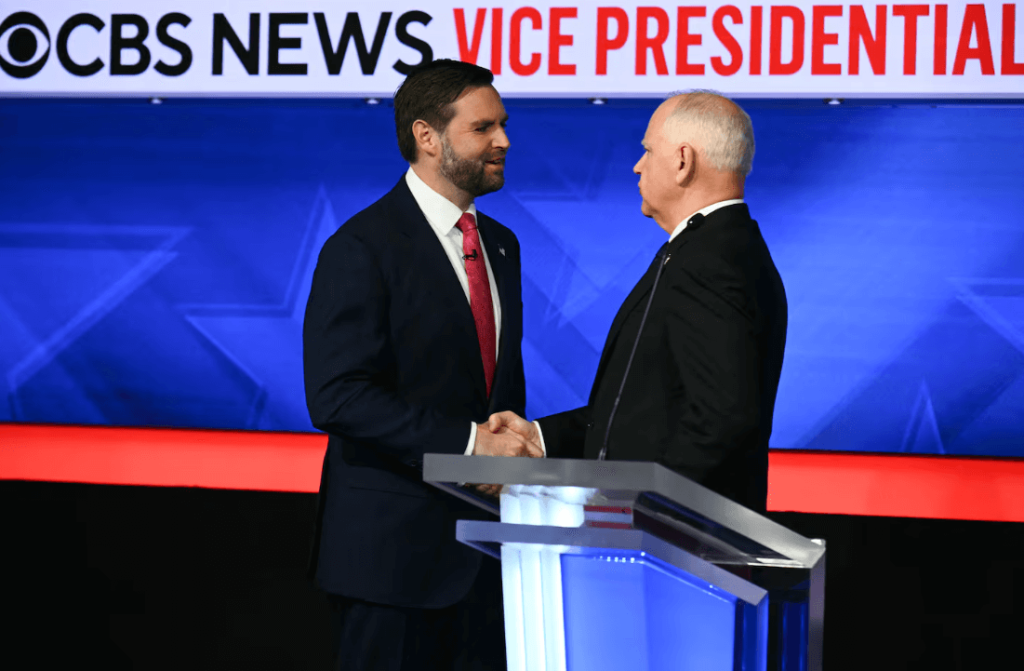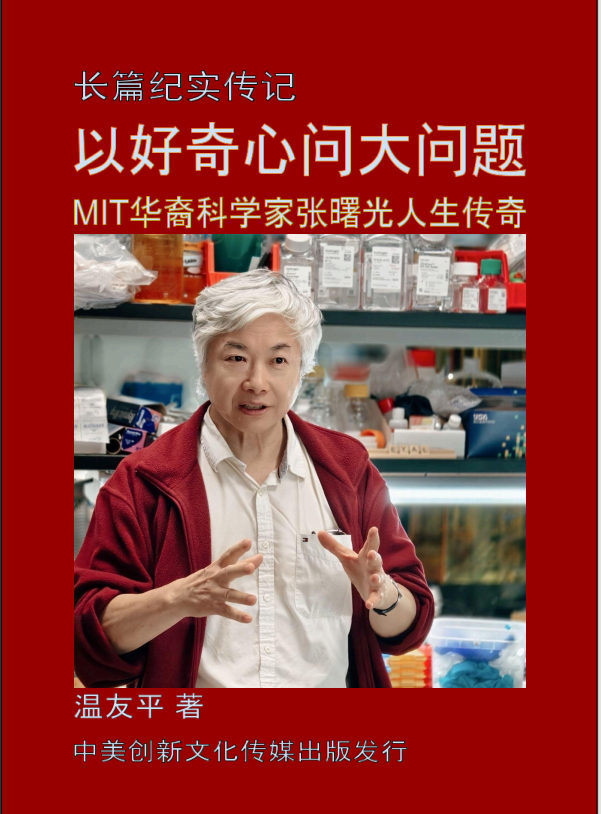【中美创新时报2024 年 10 月 2 日编译讯】(记者温友平编译)在数百万选民的注视下,俄亥俄州参议员 JD Vance 和明尼苏达州州长 Tim Walz 本可以就无子女的猫女和“奇怪”的嘲讽而争吵,但第一场也是唯一一场副总统辩论并不是关于他们——而是关于他们的潜在老板和他们对国家愿景的鲜明差异。对此,《波士顿环球报》记者萨姆·布罗迪(Sam Brodey)作了下述报道。
周二晚上 90 分钟的 CBS 新闻辩论中的一次特别交流强调了这种动态:在关于移民问题的长时间来回争论中,沃尔兹和万斯都同意对方希望真正解决系统中的问题,但他们的竞选伙伴却没有。
在这种充满敌意和不愉快的政治环境中,这些短暂的一致时刻——以及相对实质性的政策讨论——可能令人感到困惑。“这是一次健康的对话,”沃尔兹在一次关于枪支的交流中说道,在交流中,万斯对明尼苏达州州长讲述的他儿子目睹枪击事件的故事表示同情。
即使周二沃尔兹和万斯之间表现出的尖刻言辞无处可寻,但这场竞选的激烈程度——以及经济、堕胎权和气候变化等问题对国家的重要性——贯穿了整个过程。
虽然两位副总统候选人在各自的政党中激起了强烈的积极反应,而在对方的政党中激起了强烈的消极反应,但他们似乎都明白,他们在辩论中的基本作用是强调这些利害关系,赞扬他们的竞选伙伴,并攻击对方的旗手。
在开场几分钟里,沃尔兹多次攻击前总统唐纳德·特朗普,从他上个月在辩论中漫无边际的表现,到他的许多前助手对他人品的怀疑。与此同时,万斯也做出了同样的回应,他抨击副总统卡马拉·哈里斯的记录,试图将她描绘成事实上的现任总统,未能解决她想要解决的问题。
当被问及特朗普拒绝接受 2020 年大选失败的原因时,万斯也拒绝承认特朗普输了,同时淡化了前总统为阻止和平移交权力所做的前所未有的努力,这是当晚最激烈的环节之一。
州长最终向万斯本人施压,但无济于事。“这是一个令人震惊的无解的回答,”沃尔兹说,万斯试图通过指控哈里斯在冠状病毒大流行期间审查言论来转移话题。
副总统辩论通常是事后才想到的,但由于竞选活动的剧烈动荡,它具有了额外的意义。首先,距离 11 月 5 日仅剩不到一个月的时间,哈里斯和特朗普不太可能再次进行辩论。拜登总统退出竞选,哈里斯成为民主党候选人中的佼佼者,这凸显了二号人物的重要性,尤其是在共和党方面,因为如果特朗普获胜,他将成为有史以来最年长的总统。
副总统候选人面临的风险是,出色的表现可能不会赢得很多选票,而糟糕的表现可能会拖累整个竞选团队——这是两位候选人在总统竞选前都无法承受的,民意调查显示,本届总统大选的胜负差距可能比四年前还要小。
这位俄亥俄州参议员在整个辩论过程中一直表现得更加圆滑,巧妙地避免回答问题,甚至试图将特朗普的弱点说成是优势。他避免对沃尔兹进行负面攻击,并借此机会编织出他从贫困中崛起到参议员的故事——对于这位在之前的新闻发布会上经常表现得好斗的候选人来说,这是一个鲜明的转变。
与此同时,沃尔兹经常说错话。有一次,他显然是无意中说自己和“校园枪手”是朋友;还有一次,当 CNN 报道他声称自己在天安门广场屠杀期间在中国时,但实际上并没有,州长没有准备好答案。“我有时很笨,”沃尔兹说,然后承认他“在这件事上说错了话”。
万斯并没有真正抓住这些失误,但沃尔兹主动向万斯施压,要求他谈论主持人没有谈论的话题,比如参议员夸大了俄亥俄州斯普林菲尔德海地移民的虚假指控。“当它成为这样的话题时,我们就会将其他人非人化和妖魔化,”沃尔兹说。
除了那次交流和 1 月 6 日的那次交流外,沃尔兹最强调的是对比堕胎权。当万斯说民主党人太“支持堕胎”时,沃尔兹回答说:“我们支持女性。我们支持自由做出自己的选择。”
这位俄亥俄州参议员经常被要求为他的竞选伙伴的各种说法和错误言论辩护——他巧妙地扮演了这个角色。当被问及特朗普在试图废除《平价医疗法案》八年后,曾备受诟病的回答是“有计划的概念”,万斯说:“你知道,很多人都批评过这个‘有计划的概念’的言论。我认为这是非常简单常识。”他甚至声称特朗普改进了他试图摧毁的奥巴马时代的医疗保健法。
辩论前,双方阵营一如既往地大肆宣传对手的技能,并淡化对自己表现的期望。沃尔兹被认为是一位才华横溢的沟通者,但在明尼苏达州,他从未以特别强大的辩论者而闻名;万斯不是天生的演讲者,但他喜欢辩论,反应敏捷。
在辩论前几天,两人都保持低调,沃尔兹与密歇根州的盟友聚在一起准备辩论——包括扮演万斯的交通部长皮特·布蒂吉格——而万斯则在辛辛那提的家中做准备。沃尔兹在明尼苏达州代表团的老同事、众议院多数党党鞭汤姆·埃默 (Tom Emmer) 担任万斯的陪审团对手。
然而,这位俄亥俄州参议员在辩论阶段的表现可能比他的民主党对手更为犀利:近几个月来,他接受了主流媒体的多次对抗性采访,有时每周都会参加不止一场大型周日新闻节目。他已经多次被问及可能的辩论话题,比如他过去对特朗普的厌恶,以及他攻击“没有孩子的猫女”的有争议的言论。
沃尔兹之所以能成为副总统候选人,部分原因是他在电视采访中的吸引力,但自从被选中以来,他还没有接受过一次主流媒体、电视或广播媒体的一对一采访。他唯一一次出现在这样的场合是在 8 月,当时他和哈里斯一起接受了 CNN 的联合采访,在采访中,达娜·巴什 (Dana Bash) 就沃尔兹的军事记录被歪曲一事向他施压。州长也很少与随他一起参加竞选活动的记者进行公开讨论。
辩论中产生的时刻将决定每位候选人的胜负——两位候选人在全国都不太出名——对数百万选民来说,无论是正面的还是负面的。但每场辩论都以一个简单的结束语结束:不要投票给他们,而要投票给他们的竞选搭档。
题图:参议员 JD Vance 和明尼苏达州州长 Tim Walz 在辩论结束时握手。ANGELA WEISS/AFP via Getty Images
附原英文报道:
The Walz-Vance debate was civil. But it highlighted the campaign’s intensity — and the election’s stakes.
By Sam Brodey Globe Staff,Updated October 1, 2024
Senator JD Vance and Minnesota Governor Tim Walz shook hands at the end of the debate.ANGELA WEISS/AFP via Getty Images
With millions of voters watching, Senator JD Vance of Ohio and Governor Tim Walz of Minnesota could have brawled over childless cat ladies and “weird” taunts, but the first and only vice presidential debate wasn’t really about them — it was about their potential bosses and the stark differences in their visions for the country.
One particular exchange during the 90-minute CBS News debate on Tuesday night underscored the dynamic: during an extended back-and-forth on immigration, Walz and Vance both agreed that the other wanted to genuinely fix problems in the system, but their running mate didn’t.
In this bitter and unsavory political environment, those brief moments of agreement — as well as the relatively substantive policy discussion on display — were perhaps disorienting. “This is a healthy conversation,” Walz said at one point, during an exchange on guns, in which Vance expressed sympathy over a story the Minnesota governor told about his son witnessing a shooting.
Even if the vitriol that has been on display between Walz and Vance was nowhere to be found on Tuesday, the intensity of this campaign — and the stakes for the country on issues like the economy, abortion rights, and climate change — infused the proceedings throughout.
While the two vice presidential candidates inspire strong positive reactions in their own parties, and strongly negative ones in the other, both seemed to understand their essential role in the debate was to emphasize those stakes, talk up their running mates, and attack the other party’s standard-bearer.
In the early minutes, Walz repeatedly attacked former president Donald Trump, from his rambling debate performance last month to comments made by many of his former aides doubting his character. Vance, meanwhile, responded in kind, going after Vice President Kamala Harris’s record, seeking to frame her as the de facto incumbent in the race who has failed to address the problems she says she wants to solve.
One of the most charged sections of the night came when Vance, asked about Trump’s refusal to accept his defeat in the 2020 election, also refused to say Trump lost while downplaying the former president’s unprecedented efforts to stop the peaceful transfer of power.
The governor eventually pressed Vance himself, to no avail. “That is a damning non-answer,” Walz said, as Vance attempted to deflect by alleging that Harris censored speech during the coronavirus pandemic.
The vice presidential debate, typically an afterthought, took on added significance thanks to the dramatic turbulence of the campaign. For one, Harris and Trump are unlikely to debate again, with barely a month left before Nov. 5. President Biden’s exit from the race and Harris’s ascension to the top of the Democratic ticket underscores the importance of the number two role, particularly on the GOP side, given that Trump would be the oldest person ever to become president if he wins.
The risk for VP nominees is that a great performance may not win many votes while a bad performance could be a drag on the entire ticket — something neither candidate could afford ahead of a presidential contest that polls indicate could be decided by even narrower margins than four years ago.
The Ohio senator was consistently more polished throughout the debate, deftly avoiding answering questions and even attempting to cast Trump’s weaknesses as strengths. He refrained from negative attacks on Walz and took opportunities to weave in stories from his well-known rise from poverty to the Senate — a stark departure for a candidate who has often come across as combative in previous press appearances.
Walz, meanwhile, misspoke often. At one point, he apparently said by accident that he was friends with “school shooters”; at another point, when pressed on CNN reporting that he has stated he was in China during the Tiananmen Square massacre when he was not, the governor did not have an answer at the ready. “I’ve been a knucklehead at times,” Walz said, before admitting he “misspoke on this.”
Vance did not exactly pounce on those missteps, but Walz proactively pressed Vance on topics the moderators did not, such as the senator’s amplification of false claims about Haitian migrants in Springfield, Ohio. “When it becomes a talking point like this, we dehumanize and villainize other human beings,” Walz said.
Aside from that exchange, and the one about Jan. 6, Walz was most emphatic in drawing a contrast on abortion rights. When Vance said Democrats were too “pro-abortion,” Walz responded, “We’re pro-women. We’re pro-freedom to make your own choice.”
The Ohio senator was often put in the position of defending his running mate’s various claims and misstatements — a role he executed skillfully. Asked about Trump’s much-maligned answer that he had “concepts of a plan” after eight years of attempting to repeal the Affordable Care Act, Vance said, “You know, a lot of people have criticized this ‘concepts of a plan’ remark. I think it’s very simple common sense.” He went so far as to claim Trump improved the Obama-era health care law he tried to destroy.
Before the debate, both camps, as is customary, hyped their rival’s skills and downplayed expectations over their own performance. Walz is considered a talented communicator but has never been known in Minnesota as a particularly strong debater; Vance isn’t a natural on the stump but relishes debates and is quick on his feet.
Both kept a lower profile in the days leading up to the debate, with Walz huddling with allies in Michigan for debate prep — including Transportation Secretary Pete Buttigieg, playing Vance — and Vance getting ready at home in Cincinnati. Walz’s old colleague in the Minnesota delegation, House majority whip Tom Emmer, served as Vance’s sparring partner.
The Ohio senator, however, may have come to the debate stage in sharper fighting form than his Democratic rival: he has done a number of adversarial interviews with mainstream outlets in recent months, sometimes hitting more than one marquee Sunday news show each week. He had already been repeatedly pressed on likely debate topics, such as his past distaste for Trump and his controversial comments attacking “childless cat ladies.”
Walz rose to the top of VP contention in part because of his appeal in televised interviews, but since his selection he has not sat for a single one-on-one interview with a mainstream national print, TV, or radio outlet. His only appearance in such a venue came in August, when he and Harris sat together for a joint interview on CNN, in which Dana Bash pressed Walz over misrepresentations of his military record. The governor has also rarely engaged on the record with reporters traveling with him on the campaign trail.
The debate produced moments that will define each candidate — neither of whom is widely known nationally — both positively and negatively to millions of voters. But each ended with a simple closing message: not to vote for them, but for their running mate.

